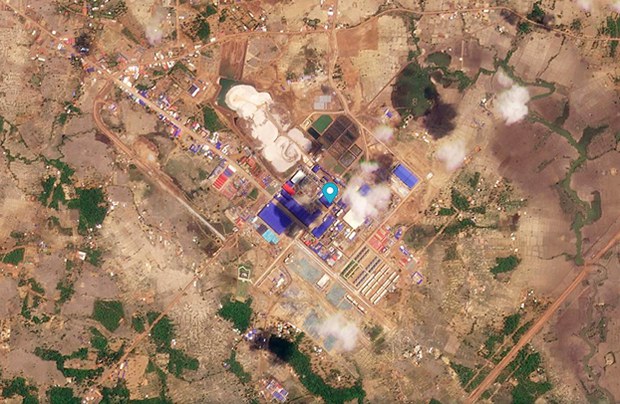An influx of Chinese laborers at a potash mine in central Laos has pushed their number to about 3,000, far higher than Lao workers, which number about 100 – despite an agreement that mine operators must hire more domestic workers than Chinese, sources have told Radio Free Asia.
In recent months, some 1,000 Chinese workers have gone to the mine in Khammouane province, which has led to layoffs of Lao workers, many of whom have not been able to find jobs, residents and government officials say.
The 35-square-kilometer (13.5-square-mile) potash mine in Nong Bok district is operated by Sino-Agri International Potash Co., Ltd., a subsidiary of Asia Potash International Investment (Guangzhou) Co., Ltd., which is linked to entities directed by China’s governing State Council.
Much of the potash – a soluble form of potassium, used for crop fertilizer – is exported to China, which has made acquiring more of the mineral a priority.
The Chinese laborers have work permits and are working legally at the potash mine, which has 152,000,000 tons of pure potassium chloride reserves, an official from Laos’ Ministry of Labour and Social Welfare said.
But the Lao government has been unable to control their numbers because Chinese investors who run the operations want to hire their own workers because they say Lao workers lack skills, a government official said.
The imbalance violates a memorandum of understanding that the Lao government signed with the Chinese mine owner, a government official said.
One Laotian who used to work at the mine accused the government of allowing the Chinese into the country to compete with unskilled Lao workers, who were subsequently laid off. As a result, some had to return to their home villages or find work in other places, making them vulnerable to human trafficking.
Most of the permanent workers at the mine are Chinese, while Laotians are hired as temporary laborers, said a Laotian who declined to be identified so as to speak freely.
“Chinese workers dig tunnels [and] build the infrastructure of the mine,” he said.
Laotians mostly work in construction, such as building roads, offices and camps for the permanent workers, but are laid off after the projects are completed, he added.
The temporary, unskilled Laotians working at the mine are mostly from other provinces because most locals don’t want to work there due to the low wages, said a local villager.
“Local laborers know that they pay low wages, so they don’t want to work in the mine and go to work somewhere else,” he said.
Laotians also are concerned about being exposed to chemicals, when they have no workers’ benefits or medical care under temporary contracts, sources said.
Unskilled Lao workers at the mine receive 5.4 million kip (US$280) per month, though the Chinese company that runs the mine pays skilled workers about 10,000-20,000 Thai baht (US$287-574) a month, said a Lao villager who used to work there.
Sino-Agri has come under fire by Lao residents who lived nearby and have accused the company of not properly compensating them for the loss of their homes and farms to the mine project, RFA reported earlier.
In December 2022, authorities arrested and later released up to five villagers who protested against the company, saying they had not received any money for their property losses.
Locals who have been forced to give up residences and businesses to Laos’ infrastructure-heavy economic development efforts often complain that they have not been properly compensated.
Sino-Agri signed a memorandum of understanding with the Lao government in March to build a “smart-eco industrial city” on 20 square kilometers of land in Nong Bok and Tha Khek districts, RFA reported. The move raised additional concerns among villagers living in the vicinity about negative impacts to their communities and their forest-based livelihoods.







